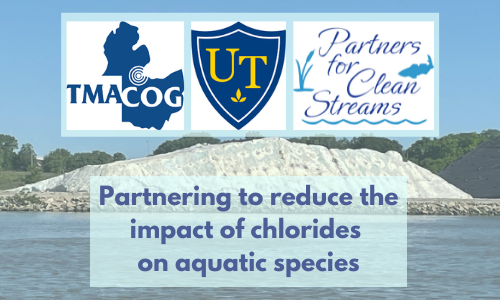
Every winter, rain and snow wash road salt into our ditches, streams, and rivers, which degrades water habitats by adding excess chlorides. Too much salt can be toxic for invertebrates and fish. Experts agree that cutting down pollution at its sources will have a positive impact. This year, a team of three MAAC collaborators will begin a multi-phase project to do exactly that, targeting BUI 6 (Degradation of Benthos) and BUI 3a (Degradation of Fish Populations.)
Did you know – a 2005 study showed that in urban streams, our water can be up to 25% saltier than sea water, just due to road salt use? Dr. William Hintz, assistant professor in the University of Toledo’s environmental science department, was recently lead author of another study found that high concentrations of chlorides led to smaller populations of freshwater invertebrates, plus a reduction to their reproduction rate. Dr. Hintz was also recently quoted in a New York Times article covering the environmental harms of road salt.
In 2021, the Ohio EPA awarded a GLRI grant to the University of Toledo (UT), Toledo Metropolitan Area Council of Governments (TMACOG), and Partners for Clean Streams (PCS), to work together to better understand current conditions of urban streams in the AOC and make recommendations on how to reduce road salt pollution. The project is titled “Reducing the impacts of chloride on aquatic species in the Maumee Area of Concern,” and the first of its three phases starts this winter.
Phase one focuses on developing a suite of best management practices to target specific areas in the AOC that show excess chlorides and severely degraded benthos. In broad terms, UT will focus on the chloride sampling and impacts to the streams, TMACOG will identify specific equipment upgrades to reduce salt pollution, and PCS will help coordinate project implementation plans with other organizations and government agencies.
Over the next few years, this chloride reduction project will play a key role in supporting the removal of BUIs 6 and 3a. Stay tuned for updates from these MAAC partners!
